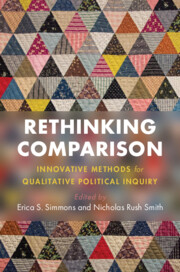Book contents
- Frontmatter
- Dedication
- Contents
- List of Figures
- List of Tables
- List of Contributors
- Acknowledgments
- 1 Rethinking Comparison: An Introduction
- Part I Rethinking the Building Blocks of Comparison
- Part II Developing New Approaches to Comparison through Research
- Theory and Imagination in Comparative Politics: An Interview with Lisa Wedeen
- Index
1 - Rethinking Comparison: An Introduction
Published online by Cambridge University Press: 24 September 2021
- Frontmatter
- Dedication
- Contents
- List of Figures
- List of Tables
- List of Contributors
- Acknowledgments
- 1 Rethinking Comparison: An Introduction
- Part I Rethinking the Building Blocks of Comparison
- Part II Developing New Approaches to Comparison through Research
- Theory and Imagination in Comparative Politics: An Interview with Lisa Wedeen
- Index
Summary
Comparison is a key tool in the social sciences. Scholars make comparisons across time and place to better understand our social and political worlds. A central technique that scholars use is often called ‘controlled comparison.’ Controlled comparisons rely on scholars holding possible explanations for the outcome of interest (e.g., revolutions or political participation) constant across different cases. This approach has been central to some of the most influential works of social science. It has helped scholars explain everything from divergent development outcomes to difference in regime type. Yet controlled comparisons are not the only form of comparison that scholars utilize to answer important questions. There is little guidance, however, for how to design or execute these comparisons or why research that does not rely on controlled comparisons can offer important insights. The goal of this edited volume is to begin to develop some of these guidelines. To do so, this volume explores two of the most fundamental questions in the study of politics: (1) why do scholars compare what they compare and (2) how do the methodological assumptions scholars make about why and how they compare shape the knowledge they produce? By answering these questions, the volume creates new resources for future students and researchers to draw upon in their efforts to advance knowledge.
Keywords
- Type
- Chapter
- Information
- Rethinking ComparisonInnovative Methods for Qualitative Political Inquiry, pp. 1 - 28Publisher: Cambridge University PressPrint publication year: 2021
- 3
- Cited by

